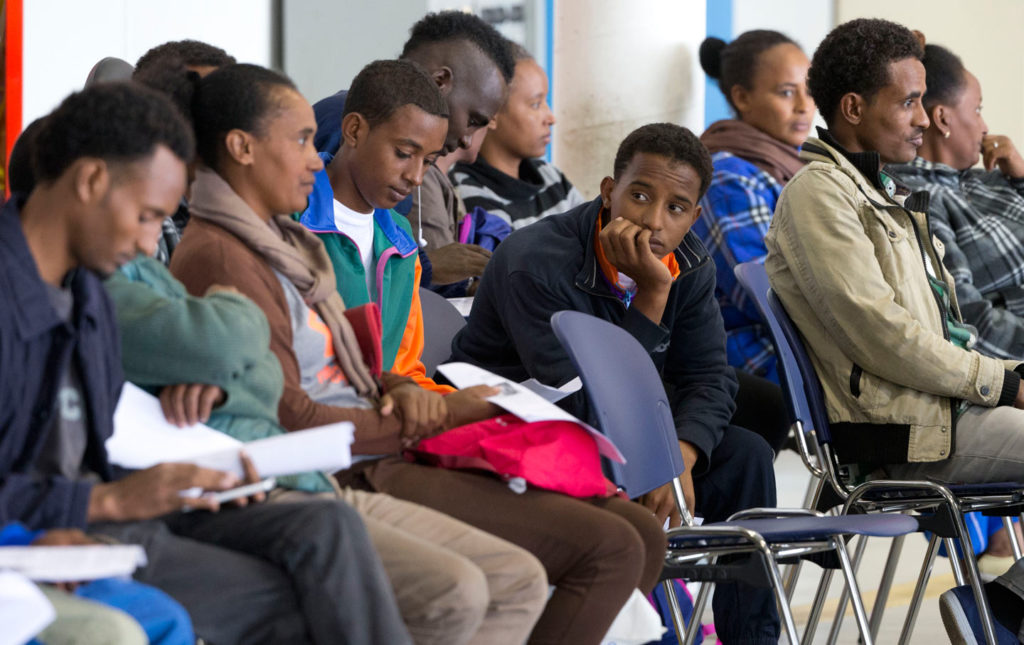Hello Aseye Asena,
How are you doing? I enjoy your organization’s platform on discussing challenging topics facing the Eritrea diaspora. I know that there is a significant Eritrean diaspora population in a wide variety of foreign countries. If you do not mind, then I would like to share this letter of a true story with your followers.

- One Eritrean family recently arrived to the USA as refugees from Ethiopia
- In the USA, they live in an area with a combination of newly arrived refugee families and American families.
- Unfortunately, in a short period of one month’s time frame of this summer after minor situations of missing items, some people in the neighborhood have started to threaten to harm the family of new Eritrean arrivals to the USA.
- Everyday they are receiving threats while the front door and back door of the house has been broken into.
- The children have given up going to school. Their mother is raising the children as a single mother who fled Eritrea from the HGDEF system of national service for life to provide a better future for her children abroad.
This single Eritrean mother is a story of every Eritrean mother whose children are suffering from HGDEF anti-youth policies of national service that fled from one bad leadership and its government to the hardships of migration in refugee camps in Ethiopia, Sudan, Libya, Uganda, and beyond. The first hardship of fleeing HGDEF is not the main hardship now there is the process of asylum, integration, and assimilation in the newly re-settled country of asylum. Although the asylum authorities may try to give refugees basic orientation and language skills. There is no program to prepare for the cultural shock of moving to a different country. Whether you live in the country for 100 years or 1 year, you will simply be treated the same as a foreigner due to your ethnic and cultural background especially in the era of anti-immigrant policies from public figures like President Trump.
Do not get me wrong, there are many successful immigrants who have done well abroad including Eritreans, but there are also many sad stories.
Eritreans began going abroad in significant numbers in the 1970s/1980s due to the Derg and later waves in the 2000s due to the HGDEF/Badme War. All Eritreans regardless of their background from city to village, college educated to grade school educated face the same hardships when settling into new environments and new societies of the foreign countries. These Eritrean parents then and now lose their children to drug abuse, gangs, sexual abuse, domestic violence, jail, dropouts from school, teenage preganancy, and other social ills. That is not to say that Eritrea is a perfect society or free from social ills in comparison to life abroad, but over in Eritrea everyone knows everyone with strong cultural values to help families cope with life challenges. Abroad there are big opportunities, educational, career-wise, and job-wise, but beyond that there are huge cultural barriers and differences in values from Eritrean society. While Eritrean children like many other ethnic refugees, face bullies and harassment at school, on the school bus, and in the neighborhood that considered a normal event abroad, the Eritrean parents face hardship finding stable employment, working double jobs or hours, receiving the lowest wages/benefits, and can be layoff or removed at anytime for a newer worker.
Even during the HGDEF period, Eritreans parents sometimes return back home or send their child back to Eritrea, out of desperation and hopelessness for internal strength and leaving behind a life of feeling culturally homeless.
I understand as immigrants we must be grateful for our opportunities. However, we must be honest about the hardships and cultural tensions that every Eritrean diaspora is facing regardless of coming as refugees in the 1970s or in the 2000s. As an Eritrean diaspora, we should not solely focus on just the political hardship of Eritrea, but the cultural tension and suffering Eritrean people face when living abroad. I am sure every Eritrean abroad has their own unique experiences and stories about hardships.For example, in the area of my small town with very small population of Eritreans, has several sad stories over the past few decades:
- An Eritrean woman (left Eritrea in the 1970s to go abroad for a scholarship opportunity) who worked in higher education, had a young adult son raised in the USA who had started to follow the wrong crowd for a few years and began to demand money from his mother. She tried to find him a job even allowing him to live with her at home and brought a car. Unfortunately, one night she returned home from a work trip and her son stabbed her to death.
- An Eritrean single mother (left Eritrea in the 2000s) brought her two sons to the USA from Ethiopia while her ex-husband remained in Eritrea as a soldier under HGDEF. Her eldest son began to attend a local school at the middle school level. The staff at the school began to complain about his lack of English language and students began to bully him for his poor English. Despite arriving in the USA for a period of less than a year, he began to feel depressed and started to avoid going to school and that began the period officers for troubled youth started to open a case on him. The Eritrean mother began to feel stressed up and was worried her son would end up getting arrested or killed in the streets by gangs because of his habit of wandering outside for many hours. Finally, she made the decision to relocate to a new town with her younger son while her eldest son moved back to Addis because of cultural homesickness and the fact that due to HGDEF policies he cannot live safely in his own country of Eritrea as a son of land where his own father in national service as a soldier.
- An Eritrean disabled woman (left Eritrea in the 2000s) with her teenage son. As the Eritrean teenager began his life in the USA, he for a short period of time felt deeply homesick and wanted to return back to the life in Addis where he had been living. The mother called the police to help calm her son. Her son was recommended for mental health treatment. In that time period, his mother got into multiple car accidents and spent time in the hospital. During that period, her son was often on his own at home and sadly took his own life just within a year of settlement in the USA as a refugee.
- An Eritrean couple (left in Eritrea in the 1970s/1980s) with their children. The Eritrean parents worked long hours and multiple jobs to cover the cost of living. This often meant that their children were on their own through school to the school bus to the house in the evening. Sadly, the Eritrean couple’s daughter was ‘groomed’ by a man with a criminal background as a minor during hours afterschool. By the time, the Eritrean parents attempted to stop the abuse for their daughter began to have trouble at school and later became pregnant from him. When the Eritrean parents try to take legal action aganist the man for his sexual abuse aganist a minor, but by that time their daughter was no longer underage and the damage towards her life was done.
A lot of Eritreans in the diaspora invest their free time on political issues , but rarely with open mind-set discuss frequently and comfortably about the cultural dilemmas and challenges of life abroad for themselves. Thanks to social media the knowledge and experience can be freely shared in a matter of minutes! Eritreans in the social media world should devote more time to issues of cultural integration/hardships, parenting challenges in the diaspora, teenage/young adult issues, aging issues from the perspective of sharing best practices and experiences from failures and success in the abroad countries. Otherwise, the same hardships and challenges described above will continue without end. Awareness on cultural tension issues in foreign countries is not sadly going to prevent bad things from happening, but at least will open the Eritrean diaspora mindset to how to have technique to manage and survive abroad.
I truly appreciate your unique program for informing the Eritrean diaspora on a variety of issues.
From the Eritrean viewpoint, that hagere (country) and aday (mother) are one. Then, a country must respect its citizens at home and children of its nation abroad. Without a strong Eritrea as a nation, that foundation as a strong population in diaspora is questionable. I myself would not be where I am today, if it was not for the love and devotion of Eritrea and its beautiful history of resilience and self-reliance in the struggle of liberation. As a young diaspora studying a small town with no other Eritrean families. If I study and work hard abroad , then I have the hope to help improve Eritrea and my family that still lives there. In the early 1990s to mid 2000s, Eritrean diaspora communities had strong unity during the honeymoon period of Eritrean independence and there many youth or community groups that unfortunately have divided into anti vs pro government also by religious and regional alliances. The main victims are the Eritreans back home and Eritrean back abroad of all this lack of unity and peaceful identity as a nation. The Eritrean diaspora have a huge heart for their nation, yet if HGDEF continues to push its own citizens against their will to be refugees as Derg did before in the 1970s/1980s, then like the true story in the beginning of my letter the mother cried-
“It is my fault that I left Eritrea and my village to enter abroad…”
The reality is that it is the fault of HGDEF and the geopolitics in the region creating this massive hardship on unwilling refugees from Eritrea.
A day very soon is coming when Eritreans will leave willing abroad to immigrate instead of fleeing as refugees or fight in conflicts against their will.
“He who fights on a foreign soil another man’s war/Not for his family or his country’s honor.”
Extra reading on this novel and Eritrean history concerning the colonial situation:
Best Regards,
Have a Wonderful Weekend!
Tesfa
















Subject: “A heart breaking letter from a concerned Eritrean brother” Tesfa, 1st August 2020
Commentary, 1 Aug 2020
It is a horror tragic story to a people whose expectation, out of Nature, is only — and ONLY — the simplest pursuit of LIFE. Is that being NAIVE to ask? No, NO, NO I don’t think so. Other human beings are free and happy in the pursuit LIFE according to their style. Why not ERITREA? Indeed, why not our Dear BLACK AFRICA? And why not other underdeveloped countries? And yet NORMAL DEMANDS and ACHIEVEMENT by other Countries are flourishing to extraordinary achievements. Is that fare WORLD? I better STOP before going too far and jeopardize my heaven-like living on Planet Earth. By the way, I AM AN AFRICAN.
rezen
Eritrea as a nation or a community is a sad story today, as a diaspora Eritrean my personal story ain’t peachy either, we all have a story to tell, some worse than others but overall it is a melancholic gut wrenching sad story. Once upon a time we had a home, a family we love and adore, a community and neighborhood which cared for each other and looked after one another, a next door father or mother who brought a child home who was found where he/she was not supposed to be, neighbors who pull their resources together to make a wedding of the less fortunate happen, a happy well fed with no worries cacophony of kids playing in every neighborhood with no threat of rounding, serene afternoons filled with the aroma of coffee roasting and smoke bellowing from the incense filling the streets, the church bells ringing and the muaazin calling for selaat, my mom tousling my hair and telling me to finish the last bite from my plate…….who doesn’t want to come to that?!! How did we squander that? How did we give permission to the enemy to do this to us? some of us might have excelled and built lucrative careers in diaspora, however it came at a hefty price, a price that can’t buy back the irretrievable loss we sustained– our happy home. Thanks Tesfa blessed weekend to you too.